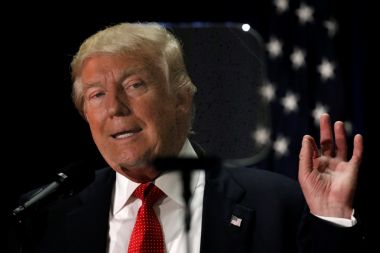Donald Trump Has A Problem With Truth: Why Don't More Christians Care?

There's a strange flavour to this year's US presidential race. Most Christians – and indeed most Americans I talk to – agree that there's not really a 'best' candidate to vote for; certainly not an aspirational one. Instead, at least from a distance, it seems that for many Americans, November 8 will offer a decision about the least worst option to run the country. It all seems a far cry from all the"hope" and "change we can believe in"propaganda of two terms ago.
The defining theme of the election doesn't seem to be hope or anything like it, but truth. Not the virtue of truth, but the absence of it. From the very start of his campaign, Republican nominee Donald Trump cast suspicion on this aspect of his main rival by calling her 'Crooked Hillary'. The accusation contained rather unsubtly within it is not entirely without foundation; there are a number of question marks about ways in which the Democratic candidate has sought to revise history or give slightly misleading answers. She's been mocked for claiming she was 'dead broke' when she left the White House first time around; for claiming that she came under imaginary 'sniper fire' in Bosnia, and for spinning her single immigrant grandparent into a set of four. More seriously, she failed to tell the truth about the infamous terrorist attack in Benghazi which killed four Americans.
However, these lapses are somewhat put into context by the truth issues with which Trump himself seems to struggle. Independent fact-checks of claims made by the two in debate find that the misleading comments made by Trump hugely outweigh those from Clinton. Of course, much of this can be attributed to style: Trump is prone to making wild, unsubstantiated statements, and also a lot more 'jokes'. Clinton is far less brash, more serious and at times humourless. Still, Trump seems to make some really glaring errors.
Here are some things Donald Trump has lied about. Mocking a disabled reporter. Rising crime. The humble way he got started in business. Putin not going into Ukraine. Clinton's gun stance. The impact of Obamacare. Crime being 'through the roof' because of illegal immigration. Clinton being responsible for Iran's nuclear programme. Trump himself opposing the Iraq war from the beginning. ISIS "not even being on the map" pre-Clinton. Obama FOUNDING ISIS. The list goes on, and on, and on. The first televised debate between the two nominees was remarkable for the reckless way Trump seems to regard truth, particularly around his own finances. His claim that he can't release his own tax returns publicly because of an IRS audit has been debunked even by the IRS.
Something extraordinary is happening despite this list: large numbers of American Christians may pledge their support to Trump in spite of his apparent inability to give a straight answer. They're backing a man who thinks it's "smart" to lie and cheat. They're essentially writing off the whole question of truth by suggesting that both candidates are equally prone to lying, when that isn't the case. And these are the "truth will set you free" people, remember.
For many Christians, it appears Trump's lies are a side issue. For them, that flavour of sin is just much less important than others. He's the candidate who is taking a pro-life stance (after reconsidering his previous position); he's the man who says he'll protect Christian values and religious freedom. As a result, some influential evangelicals and the millions of Christians who follow them seem able to turn a blind eye to Trump's failure to tell the truth under scrutiny.
Here's the really important question, though: if Trump is so demonstrably reckless with the truth and so open to giving misleading information in order to get elected, why on earth does anyone think he can be trusted on the 'defining' issues like abortion and gay marriage? His positions on these topics seem to have conveniently changed in line with evangelical pressure, but how can anyone be sure they won't shift again once he's in office? The choice for Christians is between an extraordinarily unreliable man who claims to support their worldview, and a woman who admits that on some issues, she doesn't.
Jesus seemed to think truth was pretty important; he even listed it in that central statement about himself: "I am the way, the truth and the life." Americans aren't voting for a saviour, but Christians there are trying to vote for a candidate who'll reflect the values of His Kingdom best. From a distance, their ability to ignore such a glaring contradiction to those values is striking.
Martin Saunders is a Contributing Editor for Christian Today and the Deputy CEO of Youthscape. Follow him on Twitter @martinsaunders











